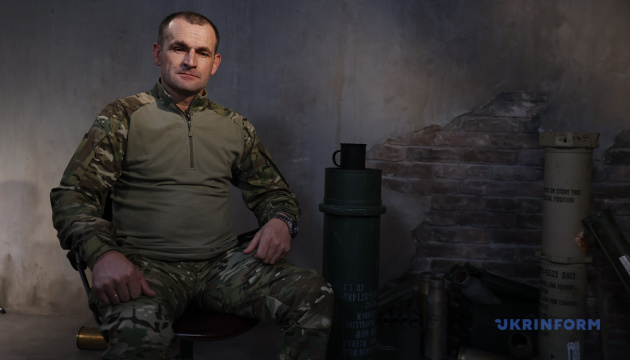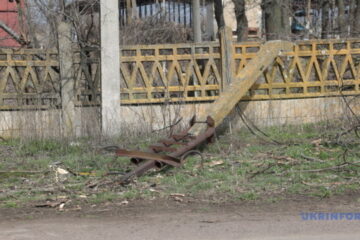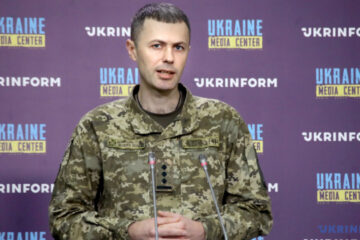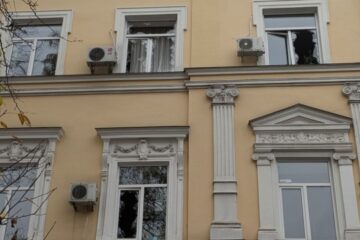Ivan Medvedyuk went to the defense of Ukraine while being a bulldozer-excavator driver at the Zasyadko Mine, a coal mining company in Donetsk. The war caught him at his workplace. He, however, did not hesitate to join the Armed Forces of Ukraine (AFU) ranks. On the first days of the all-out invasion, he went to fight carrying just a hunting rifle in his hands.
Currently, Ivan serves as deputy commander of the 97th Battalion at the 60th Independent Mechanized Brigade. His military service experience for nearly three years of the Great War includes recon and subversive missions behind enemy lines and command of a company-size unit.
In an Ukrinform interview, held as part Victory Commanders series, Ivan Medvedyuk was telling about the situations he encountered while behind enemy lines, about successful operations and the elimination of a Russian army colonel, the current situation in the Lyman stretch of the frontline, and also shared his deliberations about whether it is more difficult to shoot at a human than an animal.
[embedded content]
– Ivan, you lived a very busy life before the full-fledge invasion got started. Could you tell us in more detail about your pre-war life?
– Before the war, I was employed with the company Ozem, which is the gas production branch of the Zasyadko Mine, doing the job of driving a bulldozer-excavator. Currently I lead a grass-root team of amateur hunters, that is, my hobby is hunting.
– But you originate from Volynia region, right?
– Yes, I was born in Volynia before my family moved to Kharkiv. Well, not to Kharkiv city proper, but we had resided in a nearby village for more than 25 years by that time.
– That is, it was there where the war began for you?
– Yes, the war caught us right there. My wife and children were in a village, while I myself was on an assignment in Kreminna; we were to pick up the equipment for our job, you know, trailers, that sort of things. We had just packed up everything for the journey, but around midnight, we began hearing the sounds of very strong explosions coming from Severodonetsk. And when the full-fledge invasion had already got started, when, at four o’clock or half past five, a call came saying that Kharkiv was being pounded with shells, rockets and air strikes, we already understood that an all-out war had got under way. So we left the equipment and were already on our way up from Kreminna. While we were detouring to Kharkiv, almost reached Balakleya, we saw our weapon crews, batteries being set up in positions, moving across the fields. When we reached Kharkiv, we saw a traffic jam stretching for 4-5 kilometers, making the highway impassible. People were fleeing Kharkiv, but the road toward the city was empty. When at home at last, no one hesitated for too long. On the approach to our home village, we saw weapons with crews, tanks on trawls moving in. And the guys are like, “The tanks seem to have just arrived from the battlefield”. The vehicles were covered with mud, beaten-up a little bit, the guys’ faces dirty but happy, reflecting a moment of faith. I drove up to them and asked if they would take me into their team. They replied that, at the moment, all their weapon crews are packed to full strength, that there is no shortage of personnel. So I made the decision and immediately left for Kharkiv.
– You say you made the decision almost instantly. What motivated you to do so?
– First and foremost, the need to defend and protect my family. This had been going on for more than one day, so everyone understood that Russians would not stop until their ultimate goal is reached. I don’t know about the others, but I personally didn’t even think about whether I was going or not. I was firm on my intention to go, I just couldn’t stay at home, listening to them moving somewhere, destroying something, shooting, it wasn’t even up for discussion.
– Did the family accept your decision without discussion?
– My wife said, “Do what you deem is right, but, maybe you will stay, not go anywhere?” In the end, she blessed me for the road to war, let’s say so. The family stayed home, the wife said, “We are staying here, will not make a step back, no matter how hard they shell us” (by that time, enemy forces had approached very close to Kharkiv). So no one fled anywhere.
– So, in February 2022, you took up your hunting rifle and went for the defense of the country.
– Yes, I have a smooth-bore hunting rifle, so I took it with myself and left for Kharkiv, because people were saying that military enlistment centers either recruit everyone right away or get people signed up for recruitment at a later time. I was driving, a neighbor of mine jumped out onto the road to ask where I was going. That way, I said. He replied in a couple of curse words, asked me whether I was going too. He jumped into my vehicle: I’m going with you! I say: did you ask your wife to go? He: yes, I did it just like you did. I had my rifle with me, and he had nothing. So we moved on together, started talking to each other, there were six of us hunters, we gathered in a bunch, one had a carbine, while some others had smooth-bore rifles with them.
– Did the hunting experience come in handy for you? Is shooting at an animal the same as shooting at a human?
– You see, this experience came in handy, indeed, played its role, because a soldier having this experience can be considered a trained solder. What I am talking about? Even if a man didn’t serve mandatory military service, he has an experience with weapons, understands weapons, that is, he knows how to handle them safely, his hand/arm movements are perfected to automatism, he knows what a safety catch is needed for, how to behave, at whom to aim his weapon. As regards shooting at animals versus humans, you know, I would answer it thus: there are no humans on the other side, they are worse than animals, I can’t say anything more than this. There is no choice between to shoot or not to shoot, the choice is between to shoot or be shot. We are on our own land, I don’t think I did anything bad to them.
– I know that your war experience includes recon and subversive missions behind enemy lines. Tell us how you reached this stage?
– How did we reach this stage? We stood there, in Oleksiivka, for a month or so. Then we began documenting who was doing what, who was from among the military and who was not, in order to choose which units to reinforce with personnel. Of course, all the guys had used to each other, the hunters had conversations of one kind, others of another. We had a commander who suggested, said to us: things are like that here, according to my sources, a new squad is being organized, perhaps you could join it. We kind of understood, had some experience serving with Kraken [special operations regiment]; they were very motivated — a young guard, a different age category, but mainly they recruited younger, more assertive, as you say, shock troops. When suggested to join, we said: yes, we want to, but we have to understand the task, at least. Our goal was to return home alive, but at that time we didn’t even think of this, that is, we only thought of moving forward, halting them, driving them away from the border. But crossing over the border – no, we didn’t think of that, there was no such intention or desire to cross over the border into their land; no, my wish was just to get them driven out, knocked out of our own land. When we finally got into this unit, started compiling lists of personnel numbers, we saw we had enough people for a Company, 120 people or so. We already had an officer to command this independent unit. Afterwards, beginning on May 1, we were officially organized into what began to be known as the Special Operations Company Azov – Kharkiv. From that time on, more intentive and effective work had begun, we were assigned a specific stretch of the frontline, which we were to not just defend, but to liberate from this all, and that was when we began our forays behind enemy lines.
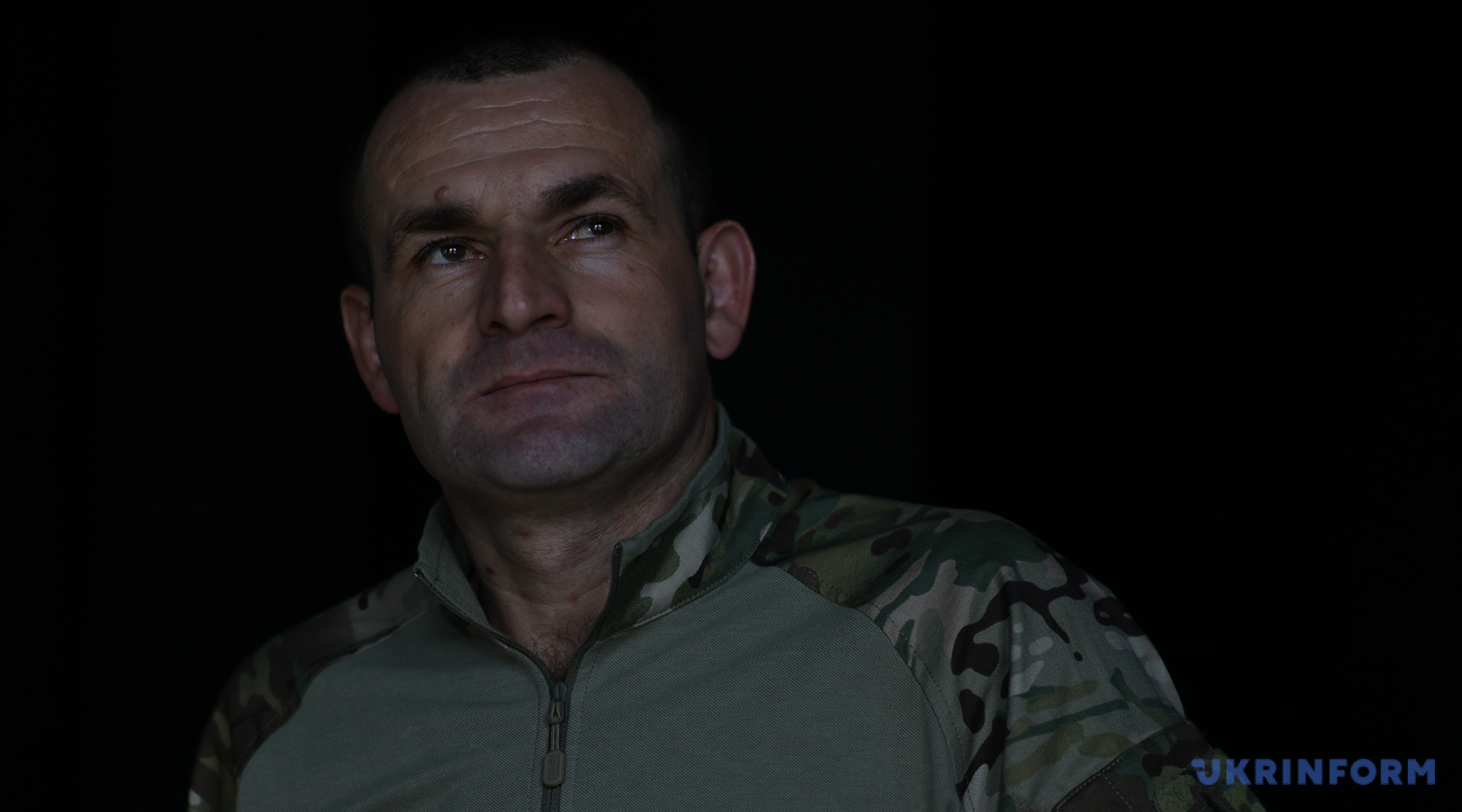
– You say that this had marked the beginning of the most serious work for you. Could you recall some interesting story, some about a successful mission you completed while on hostile territory?
– Successful missions were numerous. We came in, sat there quietly, that is, we had a specific task to do – to find out the locations of enemy hideouts. We were searching mainly for mortar emplacements, as well as artillery guns and MLRS launchers, which were giving us so much trouble – all these Grad’s, Uragan’s. We were moving through forests, beams, across fields, spent nights there. Once we spotted a hostile UAV, you know, one that works on a battery. When the battery runs out, it deploys a parachute, which brings it down, and there is a beacon that shows where it is, and their group goes out to recover it. But they didn’t expect us there. So we came and grabbed it quickly, twisted its head so that it wouldn’t blink, then hid ourselves away. Well, they were much distressed that they never found it. Their map indicated it landed there, the beacon showed it to be there, but it wasn’t there to be found. This was one of such successful missions. We took the drone away with us right away, it had a camera on it, along with other stuff.
In another operation, we set up ambushes three times to intercept an ammo truck. There were also trucks carrying food supplies, but these were mostly supplies of mortar ammunition. The third ambush worked out. We came, took a favorable position, we didn’t have to wait for long, just ten minutes or so. In previous such missions, we sometimes had to wait for a full day but never saw them turn up. But that time around, no sooner had we come and taken a position, we spotted a vehicle driving out of the field. We brought it to a stop, didn’t check their documents, because we had intelligence from our pilot that that wasn’t an ordinary vehicle, that it was used by a high-ranking officer, or perhaps was carrying a load of ammunition, well, something like that. But that time this jeep arrived earlier, before we had time to get on that road. So we had to bring it to a stop using an RPG-7 [anti-tank grenade launcher] (I served as a grenadier at that time), the grenade hit the windscreen, and the vehicle came to a stop. Then we heard our guys who stood covering up the road shouting to us that other vehicles were moving, that we have to finish it up. So we finished the mission, went down into a ditch, and saw jeeps approaching from both sides. Afterwards, when we left already, we took off a “bird” and watched how they were pulling out those who might have been left alive, but there were no survivors left. These two jeeps were then spraying the ditch from which we came out with machine gun fire, so much were they angry. Our intelligence later reported that a colonel of theirs was missing. So this operation was very significant, it raised our morale, because in these three days we were able to break up this delivery, disrupt their ammo logistics.
– What do you feel when you learn that your other operations turned to be similarly successful?
– It’s a joy to learn that there are fewer of these beasts left here on our land. I’m happy to know that the risk wasn’t in vain, that our work did succeed. It wouldn’t be true to say that we were well trained back then, instead, we never stopped training ourselves, even immediately after returns from missions. We had a taboo, that is, after a rest, we were training, training, and training again. This includes walking for dozens of kilometers, usually 15-18, this includes orientation by maps, on terrain, plus shooting practices.
– Operations like these… Are they always possible to predict? Or maybe they are necessitated by an unexpected turn of events? How did you act in situations where things didn’t go to plan?
– Look, each operation is planned for very long and meticulously. As experience suggests, quite possibly there will still be some failures. What do I mean? For example, we are tasked to reach a forest, but the forest is already burnt out, or in this area there may be an open field, there may be water, a swamp. There was no such thing that we were shown on a map: you go out from here, move there and report when arrived. We had to get in touch without fail in due time. That is, there is point A, there is point B, this is from there where we have to report that the operation continues or ends, or that some force majeure occurs. Once it happened such (it was almost always the case actually) that the walkie-talkie — when we are reporting the situation or what we are going to do next, or receiving new instructions (the commander may change his plans) — had been jammed, we failed to get in touch in due time, were able to do so some time later. Of course, the commanders got wild, ordered that we immediately turn around, because communication can be lost altogether, and they won’t know where we are and what happened to us.
When we go out for a mission as part of a group, we choose the path that we think is most suitable, safer for us. When we were agreeing it on the map with the commanders, that we will go this way and that way, I will tell you that we lied all the time, because we actually were choosing the path based on the terrain rather than the map. We saw that there was a beam, a lowland, a forest, bushes, something else. Regarding the question you asked at the beginning, about whether the hunting, hunting skills help us, yes, it helped a lot. For example, a bird flies up, an animal gets frightened by something, is walking somewhere, this all is very important. Well, animals walk, run somewhere, what is unusual about it, one might ask? You know, an animal never gets frightened for no reason. I remember once, we were in a forest climbing up from a ravine, some 10 or 15 meters away, there stood a 200-kilo bull elk with immense horns. He turned to us, looking down from above. It struck fear into me, my heart beating so hard that I could feel it even through my radio. But we knew that if he is standing calm, he is not frightened, that is, there was no one ahead of us. So we searched for all these paths by ourselves.
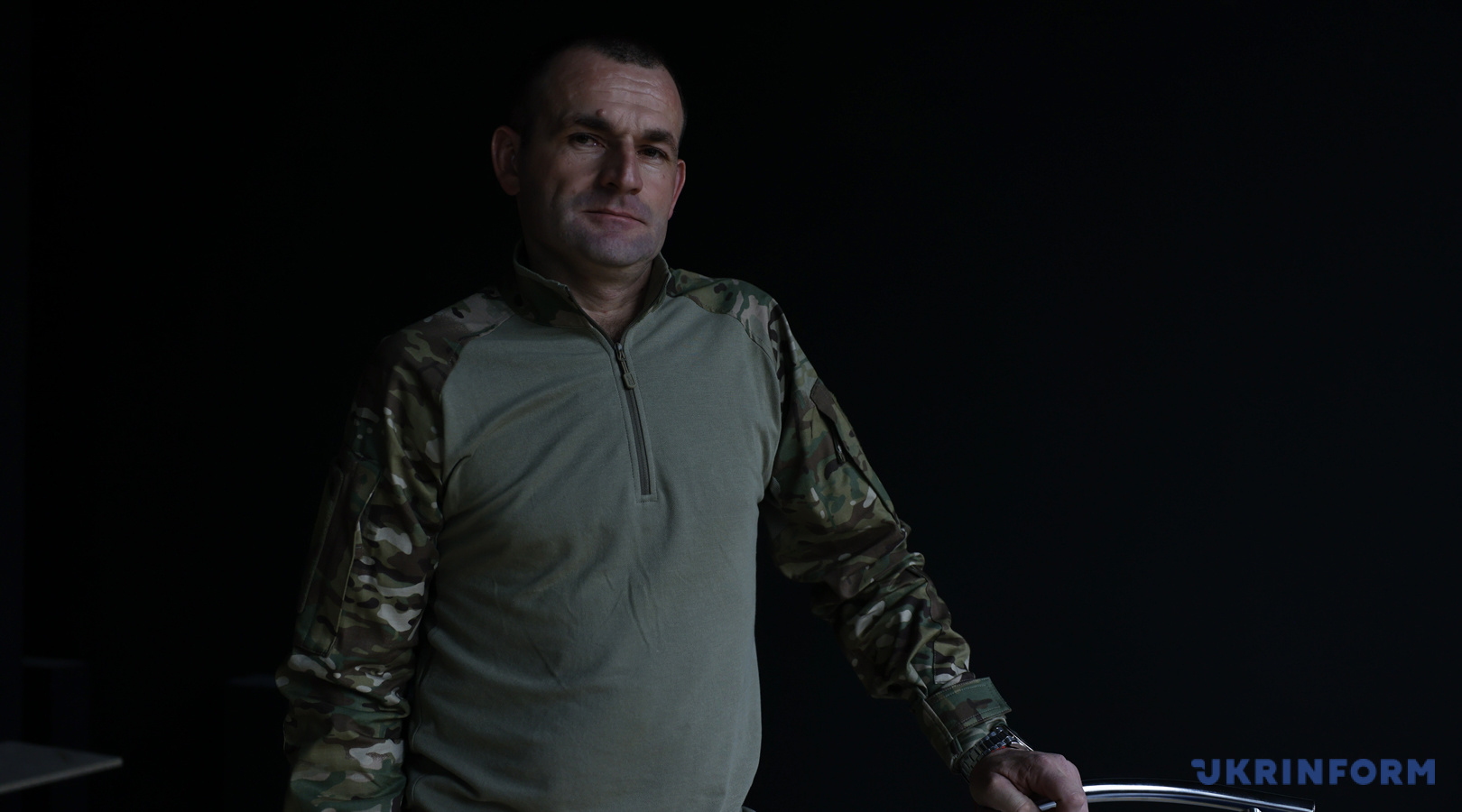
– Were there operations that left you on the verge of failure?
– Yes, of course there were such operations too, everything can’t go smooth all the time. I’ll tell you even more: there were actually lots of them on the brink of failure. In one such instance, they spotted us approaching. We were still in vehicles when they began firing from mortars. We had one of our vehicles burnt out, several guys got injured, our unit commander sustained serious injury, had his arm crushed. We had medics among us, who were just going a little behind us. So we were quick to apply a tourniquet on his arm and send him back. He was then taken to a hospital in Kharkiv without any significant blood loss or threat to his life. Having waited for the shelling to end, we calmed down a little bit and said: no, we have everything already planned, groups have moved forward. There was a kind of a stupor, but it didn’t last for long. It took us an hour or so to wait through the shelling, examine each other for injuries, bleeding and suchlike things. Then a clear decision was made – the operation should proceed to plan, as agreed upon. It was like that.
– What helped you get out of this stupor? This operation that you’ve described, was it completed successfully?
– Yes, it ended up in a success. Just on the second day we were able to caught this logistic truck, that is, we punished them for that, kind of paid them back for our wounded, gave them a rebuff. As regards coming out of the stupor, you know, there was no such thing as “that’s it, I won’t go, I’m scared”. We clearly realized that we must go there. If we go, say, 2-3 km deeper into their territory, they won’t fire at us, because it’s their territory, not ours, they weren’t expecting us there. That is, we could have some rest there. Yes, mines were flying, you sit counting them as they whistle above your head. Munitions of all kinds were flying – mortars, Grads, Uragans. In that time that was a common story.
– How can you describe the enemy, considering that you have made forays into their own territory, maybe there is something that struck you the most?
– Everything was impressive about them. First of all, not all of them (just as was the case with us) came from among the military ranks. Out of 12 people, we have as few as 2-3 who went through compulsory military service, while the remainder never served compulsory service previously. Everything was impressive, that is, they arrived brazenly, like do and welcome use, we have come. … They were very quick digging in, pulling up the reserves, ammunition, food, other supplies they needed for them. Their troops were diverse. Their units fighting in the Kharkiv axis, for example, were composed of Buryat soldiers and mercenaries contracted by private companies such as Rusichi, there were defense intelligence forces, their special operations troops were highly visible in that area of fighting. Once we ran into them, heard them talking among themselves. So we decided to go and see, because they were standing just on the path we were walking on. When we got there, we saw very curious things done there that we would like to have a better look at: there were dugouts for 2-3 people with logs laid down on top, covered with straw and hay. That is, they had got prepared, were well trained, knew how to make it so it doesn’t get dampen, so that they feel comfortable, warm, that nothing bothered them there. We found no garbage or cigarette butts around those dugouts, they had dug holes for garbage, buried everything right away, disguised their presence. So we understood that these soldiers were from special operations forces. Where there were soldiers from the LNR and DNR armies standing (we encountered them too), It was like a gypsy camp, they stole everything they could. Locals said that they were taking everything – pans, cooking pots… And when the Russian Guard units were coming out, when the bridges had been blown up, they left the LNR and DNR troops behind, did not consider them theirs. The latter, when withdrawing, were running away across fields, forests. That was the kind of coherence they had, each unit acted on its own. Some kind of interaction was there, indeed, but once got beaten up, everyone had to get out by themselves.
– You are currently second in command. What methods of command in your unit do you consider most effective? How did you set up your work?
– Look, communication comes as a matter of course. When I assumed command of my company, I talked to everyone, with all the platoons about who was doing what. Of course, everyone have their own opinions, you know, commanders are different: someone is hard on his subordinates, others are too sweet, everyone do as they see fit. As for me personally, at the time I served as interim commander, we came in Berkhivka, a village on the approach to Bakhmut. It was probably the 3rd or 5th day after we arrived. I, myself, went to get people changed in position. That perhaps earned me more respect than the fact that I had stayed by their side during eight days. There were countless attacks and assaults made on us, but we were able to repel them all. That’s to say, they probably felt the support from their commander, that the commander is not somewhere far away from the line of battle, but is by their side, right where they are, they saw that I do not shy away from coming into battle alongside them, was with them smelling the blood, the gunpowder. I told them right away: I am not going to sit back behind the frontline… And when I was walking around forest belts at nights, assembling, meeting people, bringing them into positions. Where they feel a shoulder of their commander to rely on, they talk to you, ask you some questions, give advices, know that you can give them a clue about how to do this or that… I, being a commander, am always beside them.
I am curious, because people are now different; you know, they are like calves. With me, it happens like that: I just come and that’s it, they all are replaced with others after a couple of days. I am curious to see how they set up their positions, what kind of shelter they have, whether they are telling the truth, telling that everything is ruined, that nothing has left. I tell them that the first thing they need is a shovel: the deeper you dig yourself in, the safer you are. The war has now reached the stage where it has evolved into a war of drones. When in hostile territory, the drones are watching you while you are still on the way up to an assigned position, that is, your every step is monitored, and you are awaiting an attack by drones or artillery. That is, now, it is not like it was before, when we could come in through a forest path, run, crouch down and crawl, whatever. But now it is not the case anymore, the war is now with electronic countermeasures. In order for the drones not to fly around, they must be constantly shot down, suppressed, this is all about technology.
– You are currently fighting on the Lyman front, right? Tell us what the current situation is like out there, and what are the main tasks facing you?
– The situation, I will say, as everyone says, is under control. We do not see these massive assaults like they were in winter. We have been standing there since November, there have been assaults, particularly with the use of armored vehicles — armored personnel carriers, tanks, infantry mobility vehicles – we were shot at, they fired a lot, but eventually got stuck into us. And in the winter, when we went on rotation, we left our positions and transferred them to another unit. That is, we did not move back, but moved forward by 100-200 meters. Now we had to suspend our movement for a while, because the terrain is heavily mined, and they are doing a lot of remote mining. Our aim now is to ensure that no one will give up their position. We stood through winter, through summer, and they didn’t defeat us, will never be able to do so. We go forward, leg by leg, seizing back 100, 200 meters of our land at a time, but we only go where there is green, so that we can dig in deeper, set up our positions to ensure more resilient defense against attacks.
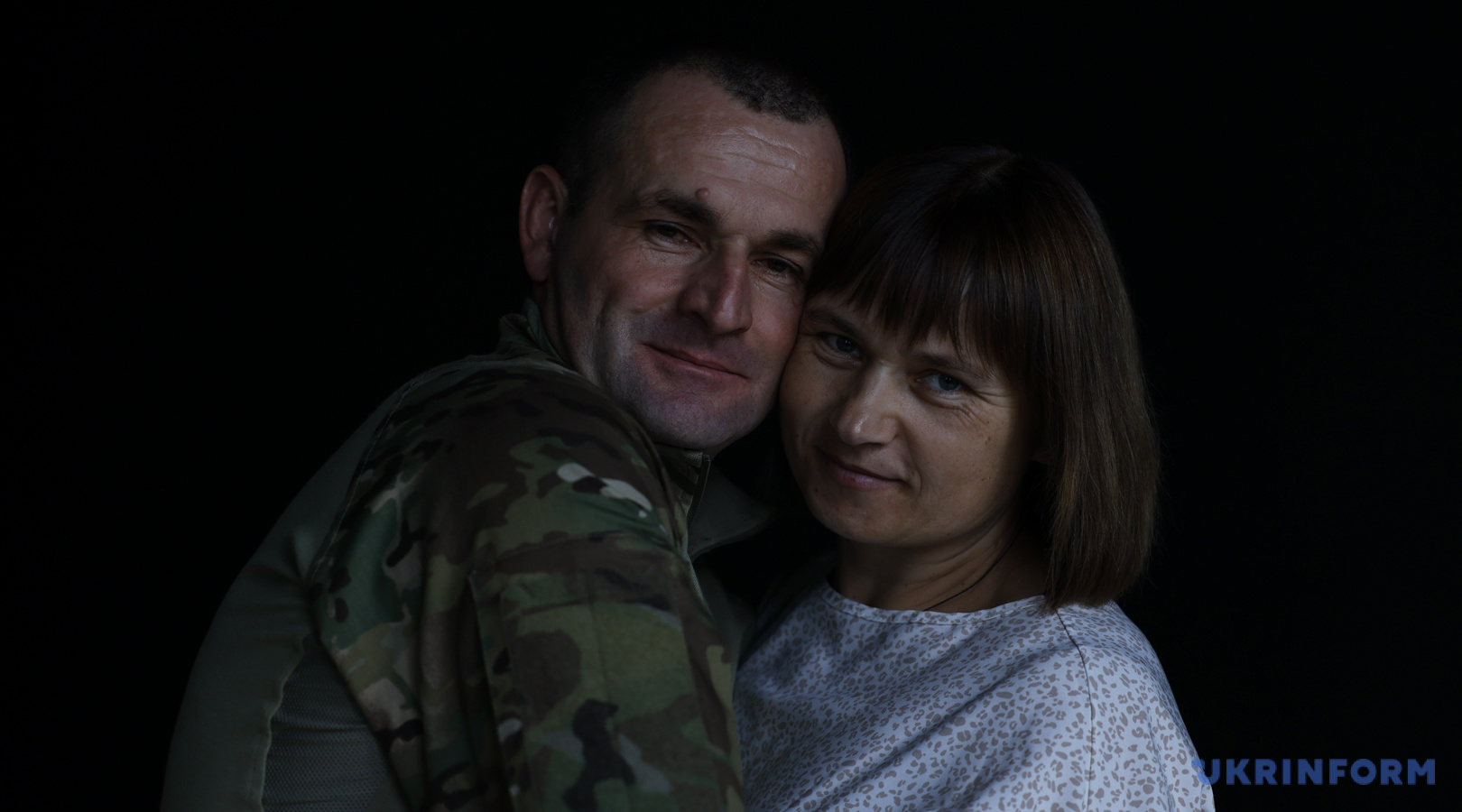
– At the beginning, you mentioned about your pre-war civilian life, you…
– I was doing the job of bulldozer-excavator driver.
– Did these skills help you in driving military vehicles too?
– Civilian equipment is one thing, and military equipment is another. As might have been expected, both are tracked vehicles; driving it at a time of peace is one thing, but driving it into battle, under fire is wholly different thing. Where you have to get behind the wheel, no problem, there is nothing difficult about it: you just need to know the vehicle’s specifications and performances, what it is capable of, and, most importantly, what the mechanics and gunners are capable of. They have already trained very well, in these battles, how to work against the enemy from defilade positions, not enfilade positions, when you drive, fully exposed to artillery fire and FPV drone attacks. … When you drive in from a defilade, it takes a while for them to find out what is firing and from which direction. They are no fools either, they too have electronic countermeasure capabilities, visual detection capabilities. We learn from intercepts that they hear armored vehicles moving, that they launch FPV drones, pull up artillery guns. We can use that time lag to do our job safely and to quickly escape from the scene.
– Regarding the Lyman axis, what can you say about fortifications, what is the situation like with this?
– In winter, the fortifications were not that strong, just began to be built up. Currently, the construction of fortifications goes much faster – anti-tank ditches, “dragon’s teeth”, razor wire barriers, they all are there. But we have no intention to stop on this line; in the future, we will have to relocate it forward.
– What would you say to the young people who are just stepping on the path of service in the Armed Forces?
– What would I say? Learning will not hurt anyone, file and remember everything, technology does not stand still. Enter the Internet, read and learn about medicine, tactics, shooting, you will definitely need this anyway. Lots of our comrades have died. I don’t think the guys would be happy if we stopped on the current line. I believe we must reach the border line where it was previously, must not let anyone dictate own rules to us. I would tell young people to learn, because it will not pass you anyway, the more questions you ask, the more answers you will receive and the more skills you will learn. If you don’t ask questions, you either know everything perfectly and deeply or you just don’t care about it.
– Regarding you personally, what would a victory mean for you, and do you have any wishes, plans, dreams for the day when the war ends in Ukraine?
– It will be a great victory, it will come some day to be sure, no matter if it’s achieved by us alone or with the help of the young people who will come to fight. As for dreams, I have some: after the war, to drive around all those places where I have been to, just to recall, already in peacetime, recall the time we were there doing our tasks, where battles were waged. Just to look at this all and realize that you have survived through it all, realize that this is what you had fought for.
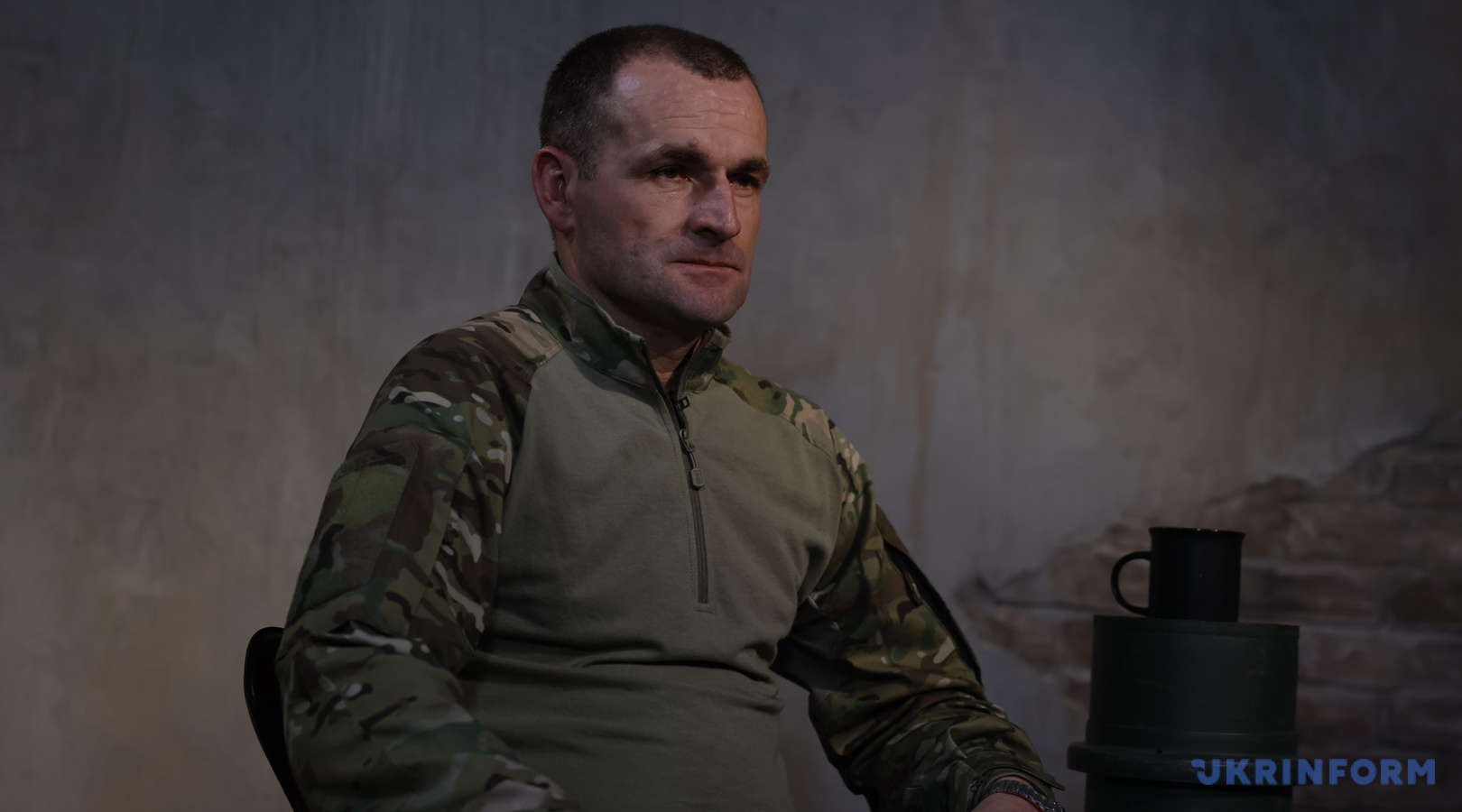
– While this interview is slowly coming to an end, I would like you to answer a series of blitz questions. I ask you brief questions, you answer just as briefly. Ready?
– Perhaps yes.
– What is your call sign?
– White.
– What does freedom mean to you?
– No one tells you what to do, you travel freely across your own land, and no one tells you what to do and what not to do. Freedom is freedom. I don’t think that we here in Ukraine have any of our rights infringed upon, like, say, the Muscovites have. They don’t have freedom, live like in a famous Soviet-era movie, you know, this stole-drank-prison romance. In 2010, I was there [in Russia] earning money, in the north, saw that they are stuck to the idea that they have oil, have natural gas, and so they are the people to be worked for. They live in lopsided houses supported with wooden beams so that they won’t fall apart altogether, but they don’t care, just used to live like this.
– What’s the most valuable gift you received while at war?
– If you mean an award from the higher command, if you like, this is probably an honorary pistol.
– What would you never be able to forgive?
– Probably treason by senior lawmakers.
– Your most favorite place in Ukraine is…
– Home.
– What makes you feel proud?
– It’s when I meet my comrades returning from a mission, all alive, and we can shake each other’s hands.
– Continue the phrase “If there were no war…”?
– This interview would never happen.
Interviewed by Diana Slavinska
Watch the full video of the interview on the Ukrinform TV YouTube channel
Source: Ivan Medvedyuk, second in command, 97th Battalion, 60th Independent Mechanized Brigade, AFU

